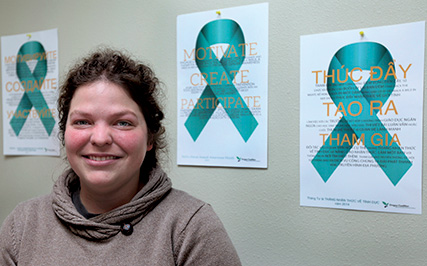Health & Education
Falla hired to resuscitate domestic violence program

Anne (pronounced Annie) Falla started as the Tribe's Domestic Violence Program coordinator at the beginning of April and is reviving a program started at the Tribe 11 years ago that lapsed a few years later.
The renewed program, funded by one federal and two state grants, will create and staff a domestic violence crisis line. Available to all clients, the line also aims to bring together a network of dedicated volunteers to staff the line, Falla said.
As the program gets underway, Falla also is seeking other domestic violence programs in the area so that the Tribe can be part of a network that shares the load and improves services.
This work is laying the groundwork to flesh out the position. Under her leadership, the Tribe will become part of a network of similar agencies in the area and the school systems the program will be working with.
Falla, 29, is setting up a confidential database including basic client demographics for future donors/grant funders and is planning to start community outreach.
"I think it will be very challenging and slow moving at the beginning," Falla said. "Then it will all start taking off."
Falla seems to have been born for the job. She was raised by "a strong female, a German mom who pushed my brother and I to be the best we could was empowering," she said. "She made it clear we would have to do our best because we would have nothing to fall back on - no real local family, no amazing trust fund, etcetera.
"We struggled to survive, skipping from apartment complex to apartment complex. My father's Puerto Rican side was somewhat in the picture, but I could see the way many Oregonians treated them differently based on their skin tones and I remember as a child questioning this deeply and wanting to speak up for my family.
"Another visual example is my brother, who was born with one arm. So many would stare, run into things because of staring, assume he also had a mental disability. I found my voice for speaking up for him at a young age."
Falla had her educational start at Oregon State University where she focused on women studies and violence against people.
When she found women studies, she said, her future in the field "seemed natural. We discussed divisions of power, giving a voice to issues that really were personal and equality. I found a major that was my perfect fit and I decided my way in life."
Professionally, she worked two years at Henderson House in McMinnville, another domestic violence and sexual assault program.
At the same time that she applied for the job at Henderson House, she applied for work in the Peace Corps. It took two years for the Peace Corps to come around and accept her application - the two years she worked at Henderson House.
She was assigned to two years in a small, rural town in Ukraine fighting HIV as a youth developer at the local social services center. The two-year experience so motivated her that she arranged for another year in the country.
On her return, she dropped by Henderson House to see her former colleagues and see what volunteer positions might be available. As it happened, Henderson House was one of the outlets the Tribe had contacted as part of its recruitment for the position.
Her experience and ambition were the qualities that made her the best candidate, said Social Services Manager Dave Fullerton. "And her passion for the field," he said. She now reports to Fullerton.
Funding for the position, awarded in December, is coming partially from the Violence Against Women Act, the same funding source that paid for the program years ago, Fullerton said.
The Tribe was awarded a three-year federal Department of Justice Violence Against Women Tribal Government Program grant totaling $394,732, which includes a Domestic Violence coordinator and funds for trainings and client support services, according to Planning and Grants Development Manager Kim Rogers.
The Tribe's new program also is being funded through a two-year agreement with the Oregon Department of Justice, which includes $10,000 a year of state funding from the Oregon Domestic and Sexual Violence Services Fund and $10,000 a year in federal Violence Against Women Act federal pass-through funding.
The Oregon Department of Justice funding is non-competitive ongoing funding. The federal funding is from a competitive award, but the number of awards offered each year to Tribes is fairly high so there are good odds for stable ongoing funding, Rogers said.
"I definitely want to do justice to the people who wrote the grants," Falla said. "I want to create something that is self-sustaining. If the grants are not re-upped in two and three years, I want to have enlisted enough sources to continue the program on a volunteer basis. And I want to know that we have all worked hard on this.
"My heart is in this," she added, explaining what it takes emotionally to do the work.
"You're trained to listen or be a witness to some pretty tough stuff day after day. It's learning to disconnect it from yourself. You're there for providing support and information. If they take the information and support, they do; if they don't, they don't. You do the best you can, but ultimately, it's a matter of what the client wants to do. They know what is right and what is wrong."
Outside of work, Falla is a gardener and walker. "I just started a salsa garden," she said, growing tomatoes, peppers, onions, garlic and cilantro.
"I really like walking, too," she said. But it is not as casual as that might sound. "Me and my mom have done 10 half-marathons together; we walk for two hours each weekend."
She lives with her mother in Newberg.
